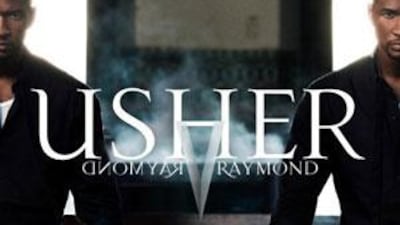With a title inspired by the 1970s divorce movie Kramer vs Kramer, Usher's sixth album is perhaps unsurprisingly a break-up record. It sees the R&B lothario (real name Usher Raymond IV) pondering his split from wife Tameka Foster and few stones are left unturned: it's a tale of love, loss and legal issues.
If you're getting a feeling of deja vu, that's because back in 2004 he released Confessions - also a break-up album, that time from TLC's Chilli. The LP didn't just cement the singer's reputation as R&B's number-one heartbreak kid - it sold 20 million albums worldwide. By contrast, the last time we heard from Usher (2008's Here I Stand) he was in uncharacteristically high spirits, but the album shifted a meager 1.5 million copies. It's no surprise, then, that the 31-year-old performer has returned to plumbing the depths of failed relationships in the hope of recapturing some of that success.
But despite the somewhat cynical approach, the bizarre focus on legal documentation (more on that later) and a tendency to mix self-pity with vulgarity in an attempt to appear boyish and alluring, Raymond v Raymond is actually rather listenable. The opener Monstar borrows from Michael Jackson and Stevie Wonder to create something soulful and remarkably catchy. Likewise Hey Daddy (Daddy's Home) manages to avoid the downright slushiness of his similarly paced love songs.
But then the cloying ballad There Goes My Baby arrives and the singer uses up almost all of the goodwill gained from the album's opening tracks. Usher's devotional murmurings sound hollow and contrived and the tempo is so slow that the song practically hibernates its way out of the speakers. The album's salvation arrives in the form of the club hit Lil Freak. With whirling strings, Missy Elliott-style beats and throbbing bass it offers Raymond v Raymond's highest point.
But despite its big chorus and powerful vocal performance from Usher, the female rapper Nicki Minaj steals the show with a verse reminiscent of vintage Lil' Kim. The album's other guest spots are less than astonishing, however. Ludacris, the Black Eyed Peas' Will.I.Am and T.I. all show up, but their cameos feel tacked on, rather than part of the fabric. Perhaps contributing to this is the album's duration, at just shy of 59 minutes, it is too long to avoid sounding repetitive.
Special mention deserves to be given to Papers, a song that boasts one of the strangest and most telling choruses in recent musical history. It features a distraught Usher who, after accepting the end of his marriage and turning into "the man that I never thought I'd be", croons: "I'm ready to sign them papers, papers, papers." It points to a level of self-absorption that renders parody useless. Raymond v Raymond can largely be divided into two halves, self-pitying ballads that draw heavily on the R&B sound of the past decade and upbeat club numbers that, by and large, offer something different and even exciting. While the album may largely be an attempt to recapture former glories, it's the brief periods when Usher looks to the future that will prove the most enduring.
ogood@thenational.ae

